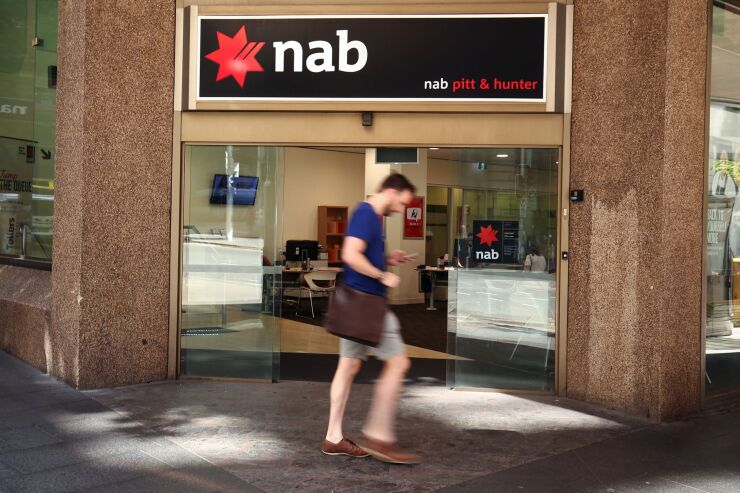Two of Australia’s biggest banks, National Australia Bank (NAB) and Commonwealth Bank of Australia (CBA), are competing to be the first to commercially launch tap-on-phone contactless payments in the country.
Both banks are piloting technology for converting NFC-enabled smartphones into contactless payment terminals without external hardware. By enabling smaller merchants to accept electronic payments without extra equipment, NAB and CBA hope to regain business lost to Square, which has been making inroads in Australia.
NAB is partnering with Visa and Melbourne-based Quest Payment Systems to pilot Quest’s Tap-on-Phone technology, which runs on the bank’s mobile app.

"The pilot will address the current gap where businesses aren’t big enough to need a POS terminal, but are established enough to accept contactless card payments," said Andy Kerr, NAB’s executive general manager, transaction banking.
The pilot, which enables customers to tap their card on a merchant’s smartphone for transactions up to A$100, the Australian limit for PIN-less contactless payments, involves several hundred of NAB’s merchants including businesses with high-volume and low-value payments.
“The response from participating merchants and cardholders has been positive,” said Jan Mason, Quest’s CEO. “The feedback we’ve got from acquirers about Tap-on-Phone is not that it will win more small/micro-business customers for them, but that it gives them a solution for micro-merchants without needing to buy costly hardware. There’s also a huge opportunity for larger chain merchants to add mobile payment options to their operations without buying additional payment terminals.”
Contactless cards have been available in Australia since 2009, and are now the primary method of payment in the country, with contactless accounting for
“CBA has also seen strong mobile wallet adoption since it launched Apple Pay for its cardholders in January 2019,” said David Budzevski, CBA’s executive manager of merchant acquiring.
As Quest’s core activity is providing payments terminals for Australian retailers, Mason said Quest is disrupting its own business model with Tap-to-Pay.
“The reality is that we need to keep evolving to ensure we can meet our customers and banking partners where they want to transact,” she said. “More and more transactions will require on-the-go solutions, and, while we don’t see Tap-to-Pay replacing payment terminals at your typical high street retailer tomorrow, the transition to software-based payment solutions will progress in the next few years.”
CBA has deployed Mobeewave’s SoftPOS technology, which works on a smartphone’s secure element, to provide mobile POS payment acceptance for SMEs, enabling them to accept contactless cards plus Samsung Pay, Apple Pay or Google Pay on their NFC-enabled Android smartphones. The bank is also using a solution developed by Mobeewave to validate open-loop payment cards used to access New South Wales’ transit network.
According to Eran Hollander, Mobeewave’s SVP of product, the Montreal-based company’s card validation solution is relevant not just to transit tickets, but to any environment such as concerts or other events where credit cards effectively become tickets.
“We have a strong partnership with Mobeewave, and we’ve worked closely with the Australian Payments Network, the national payments industry self-regulatory body, to ensure SoftPOS is robust and secure,” said CBA’s Budzevski. “As this process is finalized, we’ll commence a further scaled pilot of SoftPOS to get more customer feedback before full commercialization.”
Budzevski said SoftPOS will benefit merchants across the value chain, as it will drive a lower cost of acceptance for retailers, particularly small and medium-sized businesses.
“Merchants will have the ability to seamlessly integrate their own POS solutions and ERP systems into the SoftPOS technology, which will deliver greater mobility and potentially transform the traditional sales counter experience into a personalized, mobile interaction with customers,” he said.
CBA worked with Mastercard, Cubic Transportation Systems and Transport for New South Wales to roll out contactless open-loop transit payments in Sydney, with CBA developing the core payments infrastructure.
“Enabling open-loop transit payments aligns with our goal of removing friction across the payment experience whilst making the process more secure,” said Budzevski. “Beyond the payment component, we worked with Mobeewave and digital identity specialist Idemia to deliver a revenue protection capability to Transport for NSW. This allows transit staff to validate whether commuters have legitimately tapped onto the network, resolving a pain point for transit authorities as they look to enable open-loop. We’ll continue to innovate on this capability through our transit focus.”
Mobeewave has also deployed SoftPOS in Canada, where National Bank of Canada and Global Payments rolled out the Easy Pay service based on the technology in 2018; and Poland, where it is working with Mastercard, Elavon and Polish payments company Polskie e-Płatności to expand card acceptance. According to Mastercard Poland, over two-thirds of Polish Mastercard transactions are already contactless. However, significant number of Polish small and micro-merchants don’t accept payment cards yet.
"Our observation is that groceries, stores selling eco-food, restaurants, catering companies, kiosks, and specialist services providers are the most interested in the SoftPOS solution,” said Kamila Kaliszyk, Mastercard Europe’s head of market development Poland. "Pilot participants get a new smartphone running SoftPOS without any charges for 12 months.”
Because contactless cards can only be used without PINs for low-value transactions, and there’s currently no “PIN-on-glass” standard for entering PINs on smartphones, Mobeewave is developing technology to facilitate higher-value payments. The solution is particularly designed for Europe, where PSD2 requires two-factor authentication of contactless payments after five consecutive taps.
“Our high-value transaction solution, Mobeewave Limitless, won’t use PINs or secure elements, but will use 3DS 2.0 card-not-present technology to authenticate consumers,” said Hollander. “They’ll receive a URL sent by text to their smartphone, which takes them to a browser displaying their purchase information.”
In October 2019, Mobeewave announced a global partnership with Samsung to roll out Samsung POS, a mobile POS platform aimed at micro-merchants and small businesses based on SoftPOS and NFC-enabled Samsung smartphones. Samsung POS allows merchants to send customer receipts via email, access real-time sales data, provide sales history, and create multiple staff accounts.
The two companies will roll out Samsung POS in 2020, starting with Canada where they have been conducting a pilot with Elavon. According to Technology Strategies International’s Canadian Payments Forecast 2019, the volume of contactless payments grew by 33% in Canada in 2018, accounting for over 25% of the combined number of debit, credit and cash consumer payment transactions.





